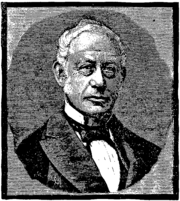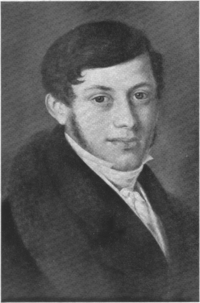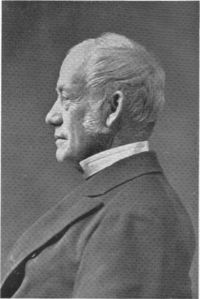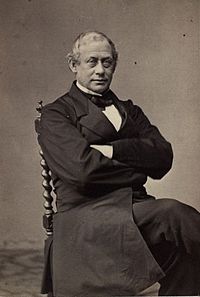- Frederik Stang
-
Frederik Stang
MP
1st Prime Minister of Norway in Christiania In office
1873–1880Monarch Oscar II Preceded by Hans Christian Petersen
(Prime Minister of Norway-Sweden)
Succeeded by Christian August Selmer Personal details Born Frederik Stang
14 June 1802
ChristianiaDied 8 June 1884 (aged 76)
OsloNationality Norwegian Spouse(s) Augusta Julie Georgine von Munthe af Morgenstierne Children Emil Stang Occupation Politician Profession lawyer[1] Religion Church of Norway - This article is about the Prime Minister, for his grandson the Minister of Justice, see Fredrik Stang.
Frederik Stang (4 March 1808, Stokke - 1884) was a Norwegian lawyer, public servant, and politician who served as Norway's first prime minister.[2] Frederik Stang was the driving force in the Norwegian political society. Stang was responsible for the start of the material development in Norway, in the middle of the 19th century. His struggle to preserve the distribution of power - "the system Stang" - led to a bitter political struggle in the last years of his life came to a shadow of his big-building efforts for the country.
Stang was known as Friederich until the late 1930s. He entered Law school at the age of 16 and graduated by the time he was 20. 22 years old, he accepted a position as lecturer of law at the University of Oslo. During this time, he published a seminal text on Norwegian constitutional law. He went over to private practice in 1834, where he distinguished himself as a trial attorney, especially in supreme court cases.
In 1861, after a brief stint as mayor of Oslo, Stang was appointed to the Norwegian cabinet. His time as a political leader was characterized by considerable discord within the Norwegian parliament and between Norway and the Swedish government.In 1865, Stang founded the Norwegian Red Cross. In 1870, he was elected a member of the Royal Swedish Academy of Sciences.
The parliament cut his pension in half in 1881; the citizens of Oslo raised money to make up for the shortfall, and he donated this to a foundation to advance Law school.
Contents
Childhood
Stang grew up in straitened circumstances. His father was most of his life an underpaid judge, first in Ryfylke and later in Nordhordland. His father struggled to find money for the childrens education. As a 13-year-old Frederick was in the Latin school in Bergen. From there, he was discharged only 16 years old and therefore needed special permission to take the test at school graduation. He remarked himself as the best of all of the 62 candidates, and the following year he took another exam præceteris. Even during school hours in Bergen, he had to make a living by giving private lessons, and as a student in Christiania, he continued as a teacher, since he was 18 years with the right to discharge their students to school graduation, and sometimes as a teacher at the Møller Institute (Møllerinstituttet). 22 years old, he accepted a position as lecturer of law at the University of Oslo. During this time, he published a seminal text on the Norwegian constitutional law. He went over to private practice in 1834, where he distinguished himself as a trial attorney, especially in supreme court cases.
Study years
In the first year of his studies, Stang was a good friend of Henrik Wergeland but they were in love with the same girl and a growing conflict became inevitable. The flamboyant "studenterliv" that a majority of the students brought with Wergeland in the lead, was in violation of Stang' ideals of duty, which was fed by economic distress. He was active in the Norwegian Students' Society and chairman of two brief periods, but withdrew along with the other of "intelligence", the circle of the most gifted and promising students Count Wedel gathered about him in "the circuit at Bogstad": JS Welhaven, Christian Birch-Reichenwald, Bernhard Dunker, PA Munch and AM Schweigaard. In particular, Wedel was preferred and probably the one he saw as his heir in politics. "You are, as if you were engaged to Stang," said the countess to her husband: "When he is present, you forget all us others." Then the circle broke away and formed The Norwegian Students' Association, Stang were the editor of the associations magazine Vidar, but other than this, his relationships with the other members were relatively distant.[3]
Stang and politics
Immediately after Stang had passed the exam in 1828, he published an article in Morgenbladet about accountability law, which had influence on the Parliament's consideration of the matter and made it clear that the country with him had been given a gift that was much needed as reinforcement of the Faculty of Law . This had two teaching positions, both of which were occupied only occasionally and often with less-than-qualified people. After a time as clerk in the Justice Department (now replaced with the Ministry of Justice and the Police) Stang worked as a "senior lecturer" in 1829, before he, two years later was appointed as an assistant professor, still only 23 years old. Peter Motzfeldt was appointed somewhat earlier, and together the two credit for having laid the foundations for an independent Norwegian law. Stang's lectures over the natural law circulated in summary form among students in 30 years, and his lectures on constitutional law was the basis for the study of constitutional law for decades to come.
Life as a lawyer
Stang was in November 1832 appointed as a Supreme Court lawyer.[4] He soon became a leading lawyer with a lucrative practice, and as a recognized legal capacity, he was also asked for public contracts. 1837-45 he was a member of Christiania City Council and in the same period, also a member of a number of public committees (for a revision of the draft Penal Code, a pension scheme for civil servants, change of impeachment rules) and controls (Norwegian Society for Development, Christiania technical organization, the Union mod Brændeviinsdrik).
In 1837, he was also appointed Attorney General, a significant vote of confidence, which, however, were not financially lucrative, and in 1839 he were replaced as the Attorney General of Norges Bank. As the Attorney General, it was his task to give advice in difficult legal matters that not seldom was of fundamental importance. One such case concerned the enforcement of the order that the Quakers could just be living in Stavanger. Stang's argument here eventually led to the free exercise of religion for all dissenters. The greatest attention at the time aroused his brilliant and successful defense in the 1845 impeachment of minister JH Vogt. Immediately after the case was concluded with an acquittal verdict, Stang was appointed Chief of the new Ministry of the interior (Now replaced with the Ministry of Transport and Communication or Samferdselsdepartementet SD).
Politician
In 1846, Stang became the most senior civil servant in the newly formed (and no longer existent) Domestic Ministry (Innenlandsdepartementet). He served in this position until 1856, and his tenure was characterized by tireless efforts to modernize Norway's economic infrastructure. In addition to improving the road network, harbors, canals, and lighthouses, he was in great measure responsible for Norway and Scandinavia's first railroad, from Oslo to Eidsvoll. He also worked hard to elevate the importance and function of agriculture in Norway, initiating the formation of a university-level school of agriculture, commissioned travelling agrarians, and encouraged better breeding among Norwegian farm animals. Stang published a long series of articles on important constitutional issues and Stang presented his fundamental political program. His starting point was that Norway had a "democratic-monarchy" form of government, where the Parliament was an expression of popular will but Stang wondered why the Constitution had been a subject to a restrictive and constraining power of the King as the main leader of the nation. Stang saw the dangers of the development of a sclerotic, bureaucratic system and pointed out the need for interaction between the will of the people and the government's superior insight. The so-called "Almennvilje(n)" and should be the moving force. His view was a sort of democratic elitism, as historians such as Rune Slagstad aptly describes it. The Government should by their educational expertise and their prerogatives ensure that decisions are systematically made public, and not only was the result of chance or narrow self-interests.
 Frederik Stang founded the Norwegian Red Cross organisation
Frederik Stang founded the Norwegian Red Cross organisation
Stang and liberalism
Stang was economically liberal, but like Schweigaard- his closest partner in parliament - he rejected the laissez faire model. Liberalism had to involve a moral element and in combination with a dynamic state serve "the People's Prosperity, Health and Formation." On this basis he rejected the absolute veto in constitutional matters, but extended the suspensive veto to include all cases that were not expressly exempted, for example financial matters. Among the changes to the constitution that he considered desirable was the abolition of the governor and that the ministers should have access to the Parliament and should command issues in-council.[5]
The government which Stang now was a member of, consisted of older, well-trained female officers with little or no political experience, who perceived themselves as heads of department and not as members of a political body. State Council was well intentioned, but weak and far from the dynamic educational force in the current reform policies that were consistent with future needs. With his extraordinary talent, Stang was widely supported by the other ministers. But he was not limited to his ministry's affairs, he also engaged in issues from the other ministries, and here he would often incur their much older colleagues' irritation at his stubbornness and temper.Stang and The Interior Ministry
The Interior Ministry had been assigned the responsibility for industrial roads, supplies, medisinalvesen, mail, transport, canal, building and fire departments, measure and weight, insurance matters, municipalities, and the statistical tables. In all these areas were Stang statsrådsår innovative. Many of the issues he brought to a solution, were old cases that had only lacked powerful control. It was such. the new old Act, as it had been worked on towards 20 years and under Stang's leadership and in cooperation with the parliamentary opposition was adopted in 1851. The law led to a boom in road construction. Government annual funding was doubled in the years up to 1850 and doubled again until 1860, and the municipal funding also showed strong growth. Planned unit was bolstered by a new veiingeniørkontor the Ministry.
Honours and awards
Frederik Stang became a member of The Royal Norwegian Scientific Society in 1846, the "Videnskabs-Selskabet" in Christiania at its founding in 1857 and the Royal Swedish Academy of Sciences in Stockholm. He was appointed Commander of the Order of St. Olav at its founding in 1847 and was awarded the Grand Cross in 1853. Four years later, he received the highest award in the country, Bürgerverdienstmedallie in gold. He was a Knight of the Swedish Royal Order of the Seraphim and had the Grand Cross of the Order of the Dannebrog and other foreign orders.
References
- ^ http://www.trueknowledge.com/q/facts_about__frederik_stang
- ^ http://www.iscanmyfood.com/hd/index.php?t=Fredrik+Stang
- ^ http://www.regjeringen.no/en/the-government/previous-governments/the-structure-of-the-registry/ministries-and-offices/offices/prime-minister-since-1814/frederik-stang.html?id=440554
- ^ http://www.rootsweb.ancestry.com/~norway/Norwegians.htm
- ^ http://www.snl.no/.nbl_biografi/Emil_Stang/utdypning_%E2%80%93_2
Political offices Preceded by
Ulrik Anton MotzfeldtMayor of Oslo
1861Succeeded by
Christian Birch-ReichenwaldPreceded by
Hans Christian PetersenPrime Minister of Norway
1861–1880Succeeded by
Christian August SelmerHeads of government of Norway First Ministers, 1814–1873 
Prime Ministers, 1873–1905 Prime Ministers, 1905–1940 WWII 1940–1945 Nygaardsvold (Prime Minister in exile, 1940-1945)
Quisling (Prime Minister, 1940 coup) • Christensen (Chairman of the Administrative Council, 1940) • Terboven (German Commissioner for Norway) • Quisling (Minister President, 1942-1945)Prime Ministers, 1945– Gerhardsen • Torp • Gerhardsen • Lyng • Gerhardsen • Borten • Bratteli • Korvald • Bratteli • Nordli • Brundtland • Willoch • Brundtland • Syse • Brundtland • Jagland • Bondevik • Stoltenberg • Bondevik • Stoltenberg1865-Present Frederik Stang • Christian August Selmer • Johan Fredrik Thaulow • Ernst Motzfeldt • Andreas Martin Seip • Kristian Wilhelm Engel Bredal Olssøn • Hans Jørgen Darre-Jenssen • Hieronymus Heyerdahl • Torolf Prytz • Jens Meinich • Fridtjof Heyerdahl • Nikolai Nissen Paus • Erling Steen • Ulf Styren • Torstein Dale • Hans Høegh • Bjørn Egge • Bjørn Bruland • Astrid Nøklebye Heiberg • Thorvald Stoltenberg • Sven MollekleivCategories:- 1808 births
- 1884 deaths
- Prime Ministers of Norway
- Mayors of Oslo
- Knights Grand Cross of the Order of St. Olav
- Recipients of the Order of the Seraphim
- Grand Crosses of the Order of the Dannebrog
- Presidents of the Norwegian Red Cross
- Norwegian lawyers
- 19th-century Norwegian people
- Members of the Royal Swedish Academy of Sciences
Wikimedia Foundation. 2010.



